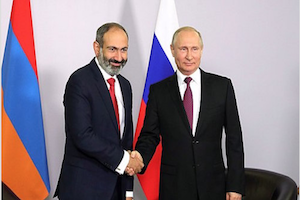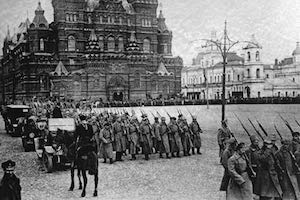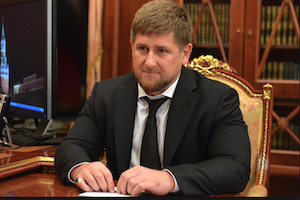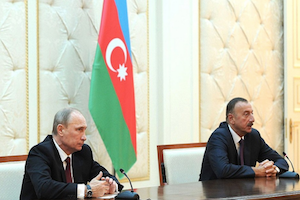Georgia's Far Right and Mainstream Politics: Lessons from the EU
By Tomáš Baranec
August 28, 2018, the CACI Analyst
In mid-May, Tbilisi once again witnessed mass demonstrations led by various liberal groups. This time the unrest was fueled by a harsh police operation against alleged drug trafficking in two popular clubs in Tbilisi: Café Gallery and Bassiani. An otherwise quite common sight in the Georgian capital was dramatized by a massive opposing rally led by several Georgian far-right groups. Although not the first such demonstration, this rally seemingly initiated a process of consolidation and unification of Georgia’s political far-right. This process could lead to a rise of far-right, nativist and anti-EU narratives in Georgia’s political mainstream.

Moscow's Role in Armenia's Revolution
By Emil A. Souleimanov and Anton Barbashin
May 31, 2018, the CACI Analyst
The “Velvet revolution” in Armenia raised concerns about the possibility of a Russian intervention in this South Caucasian republic, for the sake of preventing Russia’s key ally in the region from slipping into “Maidanization” and Armenia escaping Moscow’s foreign political and security orbit. Yet events that unfolded illustrated Moscow’s rather ambiguous attitude toward the country’s bottom-up regime change, something that Russian elites, fearful as they are of Western-inspired “color revolutions”, have otherwise done their best to forestall. The explanation for Moscow’s reception of Armenia’s revolution lies in Russia’s clout in Armenia, the character of the popular demonstrations and the regime, and Nikol Pashinyan’s reassuring stance toward Moscow and its interests throughout his campaign.

The Bolshevik Revolution Centennial and the Disintegration of the Soviet Space
By Dmitry Shlapentokh
May 25, 2018, the CACI Analyst
The centennial of the Bolshevik Revolution in November 2017 was a strange jubilee. Despite the revolution’s central importance in world history and its global importance, the centennial received scant attention in Russia. Most other post-Soviet countries plainly ignored it. The marginalization of the Revolution went along with a sharp decline in the popularity of Eurasianism, whose proponents emphasized the “symbiotic” or organic relationship between Russians and other ethnicities of the former USSR. Eurasianism also emphasized a Russia-centered historical narrative of the Soviet Union and the Russian empire. The decline of common historical space reflects a discursive and geopolitical vacuum, which the rising China will most likely fill.

Families of ISIS Fighters Return to North Caucasus
By Huseyn Aliyev
May 23, 2018, the CACI Analyst
Since December 2017, following the military defeat of the terrorist organization known as the Islamic State in Iraq and Syria (ISIS), several hundred Russian citizens, mostly from the North Caucasian republics of Chechnya, Dagestan and Ingushetia, have been brought back to Russia from Syria and Iraq. The returnees are families of ISIS fighters from the North Caucasus. So far, authorities have detained and prosecuted many returnees upon their return to the North Caucasus. The Chechen leader Ramzan Kadyrov has masterminded the return of North Caucasus nationals from the Middle East, using the opportunity to boost his image as a regional leader.

Is Russia's Soft Power Influence Effective? The Case of Azerbaijan
By Nurlan Aliyev
May 21, 2018, the CACI Analyst
On March 16, Sputnik Azerbaijan published information on Azerbaijani participants of the international sport competition Football for Friendship, financed by Gazprom. On the same day, the vice-president of the Italian Senate Linda Lanzillotta, visiting Baku, stated that Russia is behind protests against the construction of the Italian segment of the TAP pipeline. This is one example of how Russia’s means for exercising soft and hard, if covert, power coexist in the former Soviet republics. Yet soft power influences receive decidedly less attention in reporting and discussion on Russia’s relations with these countries and Azerbaijan is an illustrative case in this regard.



